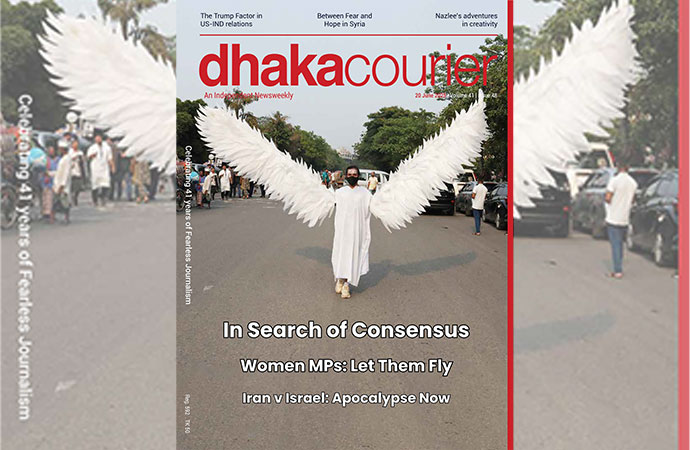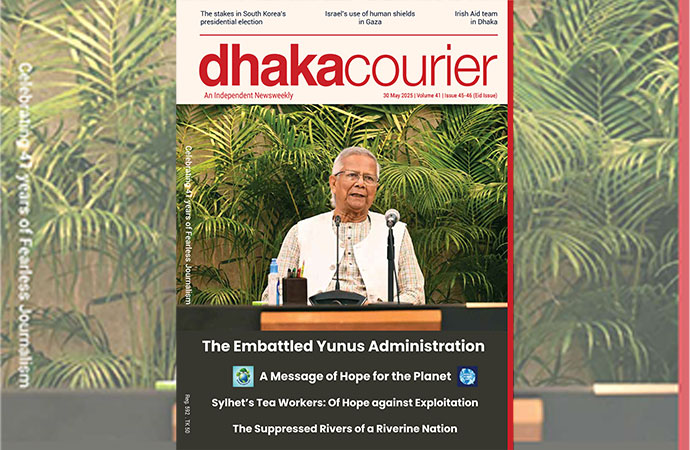Column

I chanced upon the WhatsApp profile of Tahiyat Nazifa Noor Rodoshi recently. She is a 27-year-old Bangladeshi photojournalist who works for the United News of Bangladesh and whom I met during a visit to Dhaka in January this year. Her WhatsApp profile showed a picture of two weeping humans foregrounded by a Bengali text: "Bon jane obhimane/gechhey shey obohele" ("The forest lies ignored in its injured love"). Worried that she could be facing an early-life crisis-in-love, I called Rodoshi. I was reassured when she said that she and her loverwere doing fine, and that the lines were from a song by Mohiner Ghoraguli, a West Bengal-based band that had made young hearts rock into the future, back in the insolent 1960s and 1970s.
The band's name is drawn from Jibanananda Das's lines where he declares that we are not dead yet because Mohin's horses still eat grass in the deserted moonlight of Kartik. The enigmatic lines are an apt metaphor of the Naxalite movement that produced the band and its leader, Gautam Chattopadhyay, who went to jail for his political beliefs. He was an alumnus of Presidency College, Kolkata, my alma mater as well, whose English Department I entered in 1974. I never heard of him then; I was not a Naxalite whether by choice or by compulsion; and I never attended a performance by the band because I was not sociable, preferring to bury my head in books instead. But it was clear to even someone as apolitical as I was that Bengal was not dead and that Mohin's mythic horses kept eating grass in Kartik's lonely moonlight. A certain kind of politics - romantic revolutionism - was dead, but a certain kind of humans - Bengalis - were very much alive. They kept reproducing Jibanananda's wet poetics in the parched materiality of their everyday lives.
Mohiner Ghoraguli spread its sonorous wings from West Bengal to Bangladesh, so much so that its legacy of intellectual disquiet is celebrated as much in Dhaka as it is in Kolkata. I wondered why and asked Rodoshi.
Her texted reply (in translation) was this: "Mohiner Ghoraguli's songs have built a room of their own in my life. That room is cloudy above and dusty within, a room through whose windows I can hear the rhythmic passing of trams on nearby tracks receding into the sounds of forgotten songs that lie far, far away. Those songs change my city: The streets become softer even as memories fall from my hands like letters that have gathered too much dust. I feel that an ageing love travels through those songs while my dreams leave me to walk through the streets in silence. The songs have a strange dust strewn within them, much like the fragrance of a forgotten afternoon where everything is now indistinct and yet very near.
"Those songs are almost like me and my foregone years, years that I think I have forgotten, except to find that they have pierced my heart forever. Sometimes, I think that to listen to the songs is to lose myself in myself for a while, but at other times, to listen is to recognise myself better. The songs are an unseen map of my city, a city where I walk, fall silent, and hear my own story in the gaps between the songs. Sometimes, I feel that these songs do reach out to the stars.
"The world might be getting smaller and smaller, so much so that it will have no space for imaginative words any more, for a guitar played under the gathering clouds, or for a broken voice singing of an entire city. Then the songs would have nothing but their destination but record all the same the history of floating memories, lost evenings, and the endevaour of a band in which I find parts of my departed self that I can put together again. Mohiner Ghoraguli's songs are like distant stars whose light takes time to reach the eyes but which, once seen, light the heart forever."
Rodoshi's words invoke the sensory immediacy of Mohiner Ghoraguli's lyrics lifted into music, the disquiet of their astringency translated into pleasing melody for ears. I, too, have heard the songs, but I am too old to care for myself any more. It is the young who have to bear the burden of the past that those like me will leave behind for them like a legacy, wanted or unwanted. That legacy is both intra-regional (because Bengal is the undivided land of the heart) and inter-generational.
It is good for an ageing Bengali to know that humans age but that the realms of their belonging merely ripen. Mohiner Ghoraguli represents a phase of urban alienation from the rural roots of existence, a condition that can be overcome partially by singing urban Baul (the Bengali counterpart of American urban folk) and jazz, a genre that settles into a country and a people whether or not they understand English. That is what Mohiner Ghoraguli does: It transforms a felt absence into new forms of cultural solidarity. Language is important. Mohiner Ghoraguli is probably not very popular in Guatemala or Mongolia because Bengalis are not pillars of cultural life there, I imagine. But where the two sides of Bengal, divided by history and yet united by language and the culture that language produces, meet, it is not only Tagore and Nazrul who rule hearts. Even the broken hearts of a generation in West Bengal can and does inspire the thoughts of succeeding generations both in that state and Bangladesh.
The writer is Principal Research Fellow of the Cosmos Foundation. He may be reached at epaaropaar@gmail.com

























Leave a Comment
Recent Posts
Cosmos Group VP Nahar Khan hos ...
A visiting delegation from Meta, the parent company of Facebook, Insta ...
Break the gloom, build a bette ...
Emphasising the transformative power of social business and its strong ...
‘Mobocracy’ must not prevail
The US Supreme Court allowed the Trump administratio ..
Germany dependable partner in our development journe ..
15th edition of Social Business Day: Prof Yunus to j ..